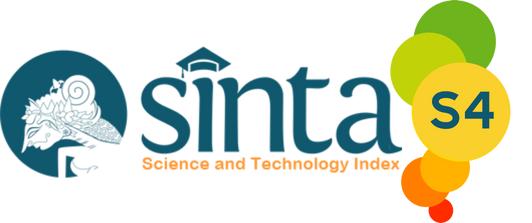Peningkatan Hasil Belajar Matematika Melalui Model Problem Based Learning (PBL) Pada Peserta Didik Kelas VIII SMP Negeri 9 Dumai Tahun Pelajaran 2021/2022
DOI:
https://doi.org/10.29303/goescienceed.v4i1.220Keywords:
Problem Based Learning, Learning OutcomesAbstract
This study aims to improve the mathematics learning outcomes of class VIII students of SMP Negeri 9 Dumai for the 2021/2022 academic year, especially circle material through the PBL model. This research uses the research method used in this research is the Classroom Action Research method. with the Kemmis and Mc. spiral model design. Data analysis in this study was carried out in a simple quantitative (statistical) manner. Quantitative analysis emphasizes the implementation of actions. The implementation of data analysis took place during the action process. The results of the research based on the cycle that had been carried out showed an increase in students' understanding of the learning material after using the PBL model as well as student learning outcomes before the PBL model was applied, which was classified as low, marked by a classical completeness percentage of 34.48%, then increased after the PBL model was applied in cycle I of 72.41% and cycle II of 89.66%. So it can be concluded that there is an increase in students' understanding of learning material after using the PBL model
References
Abuddin. (2011). Perspektif Islam Tentang Strategi Pembelajaran. Jakarta: Kencana.
Arends, R.,(2007). Learning to Teach, Penerjemah: Soetjipto, H.P dan Soetjipto,. S.M. Belajar untuk Mengajar. Yogyakarta : Pustaka Pelajar.
Arikunto, Suharsimi. (2014). Prosedur Penelitian Suatu Pendekatan Praktik. Jakarta : Rineka Cipta.
Aris, shoimin. (2014). model pembelajaran inovatif dalam kurikulum 2013. Yogyakarta : Ar-Ruzz Media.
Hadi, Sutrisno. (2004). Metodologi Research. Yogyakarta: Andi.
Rusman. (2017). Belajar dan Pembelajaran Berorientasi Standar Proses Pendidikan. Jakarta: Kencana.
Sardiman. (2014). Interaksi dan Motivasi Belajar Mengajar. Jakarta: Rajawali.
Slameto. (2010). Belajar dan Faktor-faktor yang Mempengaruhinya. Jakarta: PT. Rineka Cipta.
Sudjana, Nana. (2010). Penelitian Hasil Proses Belajar Mengajar. Bandung: PT. Remaja Rosdakarya.
Sugiyono. (2012). Metode Penelitian Kuantitatif, Kualitatif, dan R dan D. Bandung: Alfabeta.
Purwanto Ngalim.(2004). prinsip-prinsip dan Teknik Evaluasi Pengajaran. Bandung : PT. Remaja Rosdakarya.
Warsito. (2006). Bunga Rampai Keberhasilan Guru dalam Pembelajaran (SMA, SMK, dan SLB). Jakarta: Depdiknas.
Widoyoko, Eko Putro . (2009). Evaluasi Program Pembelajaran.Yogyakarta Pustaka Belajar.










